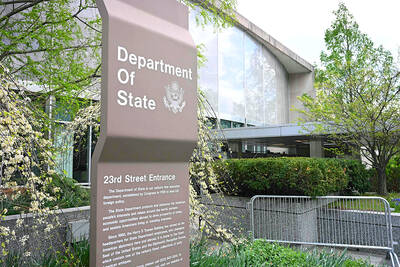Dragged into a controversy over the identity of the Republic of China’s (ROC) capital, Minister of the Interior Lee Hong-yuan (李鴻源) yesterday said that Taipei is the nation’s capital because it is the seat of the central government.
Lee was asked about the issue at a meeting of the legislature’s Internal Administration Committee after a Ministry of Education document sent to schools on Monday identified Nanjing, China, as the capital of the ROC. The document “reminded” elementary and high school administrators that the capital is Nanjing, in accordance with constitutional provisions.
Responding to a question by Chinese Nationalist Party (KMT) Legislator Johnny Chiang (江啟臣), Lee said the ROC Constitution does not specify the location of the capital. The capital is where the central government is located, he said.
“Since Taipei is the seat of our central government, it is our nation’s capital,” he said.
Nanjing was established as the ROC capital in 1927. In 1937, the KMT government moved from Nanjing to Chongqing because of the Sino-Japanese War and World War II. Nanjing became the capital again in 1946. The KMT government relocated to Taiwan in 1949 after losing the Chinese Civil War.
Lee said the government issued a decree in 1949 proclaiming Taipei the new seat of government.
K-12 Education Administration Division head Chiu Chien-kuo (邱乾國) apologized for the error on Tuesday, saying the ministry should have explained its stance more clearly.
Chiu said the document was meant to be a reminder to schools about the maps they buy.
It said Taipei should be marked as the capital of the ROC with an explanation saying the city is the seat of the central government, because according to the Constitution, Nanjing is the ROC’s capital.
“Previously, some teaching material suppliers used the same color to identify Taiwan and China on their maps or globes. We issued the document to ask school administrators to remind their textbook suppliers not to repeat the mistake,” Chiu said.
Chiu said he was willing to take responsibility for the error.

Hong Kong singer Eason Chan’s (陳奕迅) concerts in Kaohsiung this weekend have been postponed after he was diagnosed with Covid-19 this morning, the organizer said today. Chan’s “FEAR and DREAMS” concert which was scheduled to be held in the coming three days at the Kaohsiung Arena would be rescheduled to May 29, 30 and 31, while the three shows scheduled over the next weekend, from May 23 to 25, would be held as usual, Universal Music said in a statement. Ticket holders can apply for a full refund or attend the postponed concerts with the same seating, the organizer said. Refund arrangements would

Former president Tsai Ing-wen (蔡英文) on Monday called for greater cooperation between Taiwan, Lithuania and the EU to counter threats to information security, including attacks on undersea cables and other critical infrastructure. In a speech at Vilnius University in the Lithuanian capital, Tsai highlighted recent incidents in which vital undersea cables — essential for cross-border data transmission — were severed in the Taiwan Strait and the Baltic Sea over the past year. Taiwanese authorities suspect Chinese sabotage in the incidents near Taiwan’s waters, while EU leaders have said Russia is the likely culprit behind similar breaches in the Baltic. “Taiwan and our European

Taiwanese indie band Sunset Rollercoaster and South Korean outfit Hyukoh collectively received the most nominations at this year’s Golden Melody Awards, earning a total of seven nods from the jury on Wednesday. The bands collaborated on their 2024 album AAA, which received nominations for best band, best album producer, best album design and best vocal album recording. “Young Man,” a single from the album, earned nominations for song of the year and best music video, while another track, “Antenna,” also received a best music video nomination. Late Hong Kong-American singer Khalil Fong (方大同) was named the jury award winner for his 2024 album

The US Department of State on Monday reaffirmed that US policy on Taiwan remains unchanged, following US President Donald Trump’s use of the term “unification” while commenting on recent trade talks with China. Speaking at a wide-ranging press conference, Trump described what he viewed as progress in trade negotiations with China held in Geneva, Switzerland, over the weekend. “They’ve agreed to open China — fully open China, and I think it’s going to be fantastic for China. I think it’s going to be fantastic for us,” Trump said. “I think it’s going to be great for unification and peace.” Trump’s use of the